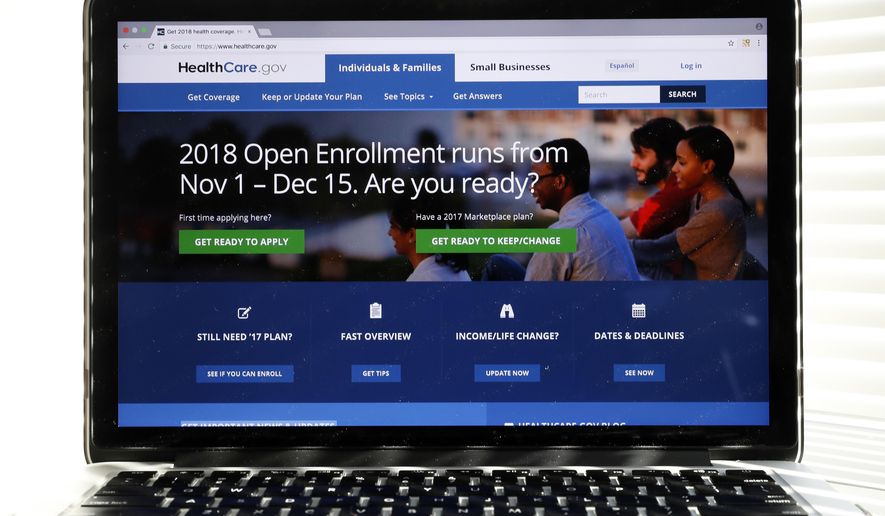Republicans won’t get another crack at repealing Obamacare until next year, but fights over tweaking the law could drag down other parts of the GOP’s agenda on Capitol Hill, including renewing funding for the Children’s Health Insurance Program (CHIP) and throwing a curve in the GOP’s tax overhaul.
President Trump seemed to back those efforts last week when he said Congress would have a lot more room to cut taxes if it would repeal the Obamacare individual mandate, which would leave people free from the requirement to buy insurance — and save billions for taxpayers who wouldn’t have to subsidize their coverage.
House Republicans balked, but some Senate Republicans say they’ll try when the bill reaches their chamber.
“I think it’s a pretty reasonable proposal to repeal the most hated part of Obamacare, to help pay for tax cuts the American people want rather than trying to eliminate popular, widely used deductions and credits, exemptions and exclusions,” Sen. Tom Cotton, one of the most prominent advocates, said on the Senate floor.
Ways and Means Committee Chairman Kevin Brady, the House’s top tax-writer, said he doubts such a move could get through the Senate, so he doesn’t want to include it in his bill, though no final decision has been made.
“Importing health care into a tax reform debate has consequences, especially one where the Senate has yet to produce 50 votes on anything related to health care,” Mr. Brady said at a Friday event hosted by Politico.
But House Republicans have taken a more modest whack at Obamacare, approving a bill Friday to siphon dollars away from it to pay another five years of CHIP. The GOP majority muscled it to passage, 242-174, earning support from just 15 Democrats.
The CHIP program insures children whose parents earn too much money for Medicaid coverage but still struggle to afford insurance. Congress allowed federal funding for the program to lapse Oct. 1, meaning some states could run out of money by December.
Bipartisan House negotiations broke down, leaving Republicans to write a bill cutting more than $6 billion from Obamacare’s public health fund, which pays for things like access to vaccines and opioid prevention, to pay for the CHIP extension.
Republicans also want to shorten the grace period for Obamacare customers who fail to pay their premiums from 90 days to 30. Cutting off their coverage sooner would save money, Republicans say, because taxpayers wouldn’t have to keep paying exchange subsidies and cost-sharing payments for the delinquent customers.
Democrats contend the change would result in roughly 700,000 losing coverage.
“I have tried for months to negotiate with Republicans to develop a bipartisan compromise. But House Republicans chose to spend the first nine months of this year trying to repeal the Affordable Care Act,” Rep. Frank Pallone Jr., New Jersey Democrat, said. “They failed, but now House Republicans are using the reauthorization of CHIP and Community Health Centers as a way to once again sabotage the ACA.”
It is unclear if the House bill can pass in the Senate, where at least eight Democrats would have to sign onto the plan to overcome a filibuster.
Senate Republicans couldn’t even get all of their own troops on board a plan to repeal and replace Obamacare earlier this year, much less win any Democratic votes.
Defectors balked at the secretive, partisan process that led to the repeal bill. They also said the uninsured rate would balloon.
Repealing the individual mandate alone would result in 15 million fewer Americans holding insurance but would save taxpayers $416 billion over the 10-year budget window, according to the Congressional Budget Office.
GOP lawmakers, who ridiculed the CBO’s 15 million estimate during the repeal debate, now want to claim the $400 billion in savings.
That’s inconsistent, said Timothy Jost, a law professor at Washington and Lee University in Virginia who closely tracks the debate.
“Savings are totally driven by lower enrollments, so it seems to me that they have to accept the higher number of the uninsured number if they accept the savings number,” Mr. Jost said. “Of course, they will argue that the higher number of the uninsured is due to people dropping coverage that they did not want anyway.”
Mr. Jost said he suspects both the uninsured numbers and savings numbers are “on the high side.”
• Tom Howell Jr. can be reached at thowell@washingtontimes.com.




Please read our comment policy before commenting.